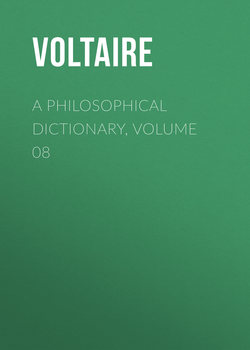Читать книгу A Philosophical Dictionary, Volume 08 - Voltaire, Вольтер - Страница 3
MORALITY
ОглавлениеBabblers, preachers, extravagant controversialists! endeavor to remember that your master never announced that the sacrament was the visible sign of an invisible thing; He has nowhere admitted four cardinal virtues, and three divine ones. He has never decided whether His mother came into the world maculate or immaculate. Cease, therefore, to repeat things which never entered into His mind. He has said, in conformity with a truth as ancient as the world – Love God and your neighbor. Abide by that precept, miserable cavillers! Preach morality and nothing more. Observe it, and let the tribunals no longer echo with your prosecutions; snatch no longer, by the claw of an attorney, their morsel of bread from the widow and the orphan. Dispute not concerning some petty benefice with the same fury as the papacy was disputed in the great schism of the West. Monks! place not to the utmost of your power, the universe under contribution, and we may then be able to believe you. I have just read these words in a piece of declamation in fourteen volumes, entitled, "The History of the Lower Empire"; "The Christians had a morality, but the Pagans had none."
Oh, M. Le Beau! author of these fourteen volumes, where did you pick up this absurdity? What becomes of the morality of Socrates, of Zaleucus, of Charondas, of Cicero, of Epictetus, and of Marcus Aurelius?
There is but one morality, M. Le Beau, as there is but one geometry. But you will tell me that the greater part of mankind are ignorant of geometry. True; but if they apply a little to the study of it, all men draw the same conclusions. Agriculturists, manufacturers, artisans, do not go through a regular course of morality; they read neither the "De Finibus" of Cicero, nor the "Ethics" of Aristotle; but as soon as they reflect, they are, without knowing it, disciples of Cicero. The Indian dyer, the Tartarian shepherd, and the English seaman, are acquainted with justice and injustice. Confucius did not invent a system of morals, as men construct physical systems. He found his in the hearts of all mankind.
This morality existed in the bosom of the prætor Festus, when the Jews pressed him to put Paul to death for having taken strangers into their temple. "Learn," said he, "that the Romans never condemn any one unheard."
If the Jews were deficient in a moral sense, the Romans were not, and paid it homage.
There is no morality in superstition; it exists not in ceremonies, and has nothing to do with dogmas. We cannot repeat too frequently that dogmas differ, but that morality is the same among all men who make use of their reason. Morality proceeds from God, like light; our superstitions are only darkness. Reflect, reader; pursue the truth, and draw the consequences.
